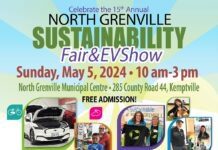For thousands of years before Europeans arrived in this area, the forests, rivers and lakes knew other people: people who lived with the land, adapting their ways to the gift of the Creator who had provided them with all they needed for life. Instead of trying to impose themselves on the land, they understood that it was there to be cared for, used responsibly and with respect; for they were not owners, they were passing through.
At places like Roebuck, large communities of as many as 1,500 people had their homes along the banks of the South Branch and the South Nation Rivers, their highways along which they travelled and traded. Across the continent they went, trading copper and furs, wampum and corn, with complex and highly-structured social and spiritual relationships with each other and with the land. Roebuck was inhabited for more than 500 years: this was home to these First Nations of Canada.
When Europeans arrived, they were welcomed and taught the ways of this new land. The inhabitants offered to share the land with the newcomers, for, after all, no-one could own the soil, the trees, the wind and the sky, but all should share it with respect. When the new arrivals fell ill, men and women like the Burritts alone in their isolated cabin, it was the passing Indians who nursed them back to health. Ironically, it was the First Nations who fell victim to the new diseases brought from Europe, and between 50% and 90% of the indigenous population died as a result.
But these nations made agreements with the newcomers, treaties which laid out their willingness to share the land. Like the Niagara Wampum Belt of 1764, they took the hands of the Europeans in peace, and when the Loyalists arrived in this region in the 1780’s, they welcomed them and offered to share this land too. And so North Grenville and Wolford were carved out of First Nations’ lands. Today, we benefit still from those treaties: we are all treaty people.
Their gift to us is part of our heritage, part of our history, and we still need to learn the ways they knew, if we are to survive, if our environment is to continue to sustain us. We have to learn to adapt to the land, and not impose ourselves on it. This may prove to be our greatest gift from the ancestors and the Creator.





